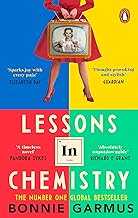 |
| (Amazon UK link) |
I started reading just a day before our group was meeting, after a busy period, but managed to read it in a few hours, finishing just an hour or so before the meeting. It’s written in a very engaging style, with short chapters; so, any time I had ten minutes free, I sat down and read another.
The main protagonist is Elizabeth Zott, who is a scientist. She’s highly intelligent, very focussed, extremely knowledgeable, and conducts excellent research. Some of us in the group thought she was likely on the autistic spectrum, as she doesn’t understand jokes, nor is she able to read people or understand their emotions. But that’s not what causes her problems: it’s the fact that she’s female. The book is mainly set in the early 1960s in the United States, when women weren’t supposed to be brilliant scientists.
Elizabeth thinks this is not just unfair but illogical. She was unable to finish her PhD (for reasons that become clear later in the novel) and although she has a job at a scientific lab, she’s treated like a lab assistant rather than a researcher. Then she meets one of the chief scientists, Calvin, and they fall in love. He is very supportive of her work and the two of them discover that they are soulmates, although Elizabeth does not want to get married.
Then a tragedy happens, and circumstances conspire to make Elizabeth leave her job. She tries freelancing and then, out of the blue, is offered a role as a TV cook. She sees cooking as part of chemistry, and refuses to go along with the sexist ideas of afternoon TV chefs - and because she treats her audience with respect, her ratings soar…
The time-frame is a tad confusing, as the novel starts in 1961 with Elizabeth, aged 30, packing a lunchbox for her four-year-old daughter Madeline. She adds some inspirational notes, which Madeline removes and saves, not wanting her classmates to think her even weirder than they do already. And then, after a few chapters, the novel moves back a few years. There's a fair bit of time-switching, although I thought it was well handled. But the story in the first part of the novel doesn't move forward until about half-way through the book.
Madeline is not just an early reader, she’s read all kinds of novels intended for adults about philosophy, crime and more. She’s a tad caricatured as a hothoused child, whose mother treated her almost like a science experiment, but she’s very likeable for all that. Madeline, unlike her mother, reads people very well and thinks a great deal about the consequences of everything that happens.
Madeline is almost my favourite character in the book. The one I liked - and enjoyed - the most was the family dog, with the unlikely name of Six Thirty. Elizabeth reads to him too, and has taught him far more words than most dogs understand, including some conceptual ones. There are a few sections of the book written from Six Thirty’s perspective, and we all, in the reading group, thought they were amusing as well as, sometimes, poignant.
The writing is light-hearted but very well-written. We all admitted to skipping the detailed chemistry explanations, but there weren’t too many and we didn’t feel as if the author was trying to educate us. But the book also covers some quite deep issues. The obvious one is the role of women in society, something which we all agreed has changed in the past seventy years, though no doubt there’s more progress still to be made.
But in addition to that, both Calvin and Elizabeth come from very broken backgrounds. Elizabeth’s father was a charlatan preacher pretending to do miracles; Calvin was mostly brought up in a Catholic children’s home, where he experienced abuse of all kinds. While there's no gratuitous detail, there are some conversations and a few scenes that are shocking, making this unsuitable for younger readers.
And that brings me to the one gripe I have with the book. It doesn’t just expose the hypocrisy of some priests and preachers, it has quite a strong atheistic agenda. Elizabeth does not believe in God, which fits well with her worldview and narrow focus on science. But she is rather scathing about people of faith, despite insisting that everyone is entitled to their own opinions. The implication in the book is that science and God are incompatible, which clearly isn’t the case. Moreover, it doesn’t appear that any of the likeable characters in the book have any faith at all, even those who haven’t had traumatic childhoods.
But other than that niggle, I thought the book was excellent. The characters are all quirky, somewhat caricatured - but that makes them memorable. The way they interact and fit together in the different subplots is perhaps a tad coincidental, but that doesn’t much matter. The whole is a thoroughly enjoyable book, one which we all liked. I would recommend this to anyone wanting something a bit different, so long as you're not negatively triggered by mentions of abuse, and so long as you don't mind the anti-God sentiments.
Review copyright 2024 Sue's Book Reviews
No comments:
Post a Comment